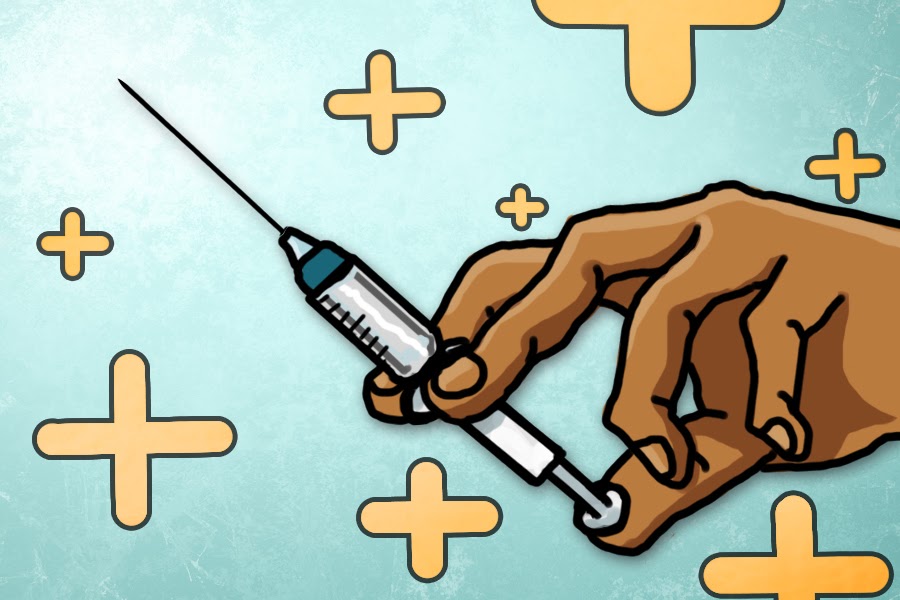What we know about the Omicron variant so far, and how you can stay safe and COVID-19-aware during the holidays
COVID-19 cases are on the rise. And with the Omicron variant, Chicago health experts say taking necessary precautions, such as testing before holiday travel and getting a booster shot before engaging in social gatherings with family.
December 1, 2021
The World Health Organization designated the highly infectious Omicron COVID-19 variant to be a cause for concern Friday.
As gatherings start to ramp up for the holiday season, local doctors and scientists are urging residents to get COVID-19 vaccination and booster shots as well as take precautions against the virus. Cases are on the rise, and some scientists like Shikha Jain, assistant professor of medicine at University of Illinois Chicago, attribute the increase to COVID-19 fatigue and indoor gatherings.
“People aren’t taking as many steps to protect themselves. People aren’t wearing masks as diligently as they were before. So I do think we’re going to see an increase in numbers,” Jain said. “But unlike last year, we do have vaccines that are going to hopefully protect a lot of people as long as they’ve gotten their vaccine series completed.”
It’s critical for children aged 5 to 11 to receive at least their first shot — if not get fully vaccinated — before engaging in holiday gatherings, said Laura Zimmermann (Feinberg ‘07), medical director of Rush University Prevention Center.
With the expanded eligibility of booster shots for all adults, Zimmermann said anyone who can get a booster should do so as the holiday season approaches.
“We know that antibody-mediated immunity wanes over time the further you get from your original shot,” said Emily Landon, a Chicago-based infectious disease specialist. “It’s becoming clearer and clearer that everyone’s going to need a booster at some point.”
Landon said waiting until it’s too late to get vaccinated is risky for your health, especially as new COVID-19 variants such as Omicron emerge.
In response to the announcement of the new variant, the Centers for Disease Control and Prevention strengthened its guidelines for vaccination. All individuals 18 and older are advised to get a booster shot either six months after an initial Pfizer or Moderna series or two months after a Johnson & Johnson one-dose vaccine. Here’s more on how to schedule a vaccine appointment in Cook County for you or your child.
Much is still unknown about Omicron, Landon said, but what they do know is that if you’ve already had COVID-19, you’re still susceptible to the Omicron variant. It may be the most infectious COVID-19 strain yet, potentially even more so than the Delta variant, Landon said.
“(Omicron) certainly has the potential to be a more common cause of a breakthrough infection,” Landon said. “Whether or not it’s going to make people sicker, whether or not it’s going to really establish itself, those are things that remain to be seen.”
With the development of vaccines since the 2020 holiday season, there have been fewer COVID-19-related hospitalizations and deaths, Zimmermann said. She said unvaccinated people account for the bulk of U.S. cases now, and she predicts cases could rise over the holidays due to gatherings among this group. Older and immunocompromised family members are especially at risk for contracting the virus.
She said preventative measures such as vaccinations are essential to try to contain the virus, rather than waiting for it to spiral out of control.
“Even if there’s only a little bit more protection conferred by the booster in one individual,” Zimmermann said, “when you scale that to a population level, it could still be preventing thousands of infections.”
While Jain said booster shots are unlikely to end the pandemic, getting one is a solid step in that direction and will provide added necessary protection as the holiday season approaches.
Additional precautions you can take, Jain said, include getting tested before traveling and not socializing if you have symptoms. Besides wearing masks indoors, she also recommends ensuring your living space has adequate air circulation and that the spaces where you plan to gather have good ventilation systems.
To avoid transmitting the virus to family members over the holidays, Landon also advises to continue wearing masks when you’re in public and to keep a safe distance from those who aren’t wearing one. Wearing a mask helps keep you from contracting the virus, Landon said, but it’s most helpful for preventing you from giving the virus to others.
“People are a lot more protected than they were last year, but I think if you just throw all caution to the wind, then you might be disappointed with the outcome,” Landon said.
Email: amittal@u.northwestern.edu
Twitter: @amittal27
Related Stories:
— COVID-19 positivity rate increases before Thanksgiving amid booster shot eligibility expansion
— NU health professionals advise caution with Thanksgiving travel, gatherings
— The Daily Explains: What you need to know about the flu season during COVID-19


